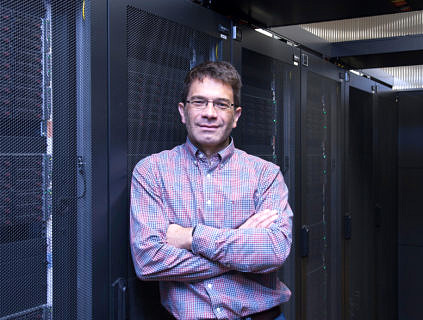Prof. Gerhard Wellein talks about sparse matrices at SPCL Bcast
Gerhard Wellein, managing director of the Erlangen National High Performance Computing Center (NHR@FAU), is invited for a seminar talk at the Scalable Parallel Computing Lab (SPCL) Bcast seminar at ETH Zürich. Everyone is invited to attend.
Title: Performance Engineering for Sparse Matrix-Vector Multiplication: Some new ideas for old problems
Time and date: Thursday, March 25, 2021, 6 p.m. CET
Abstract: The sparse matrix-vector multiplication (SpMV) kernel is a key performance component of numerous algorithms in computational science. Despite the kernel’s apparent simplicity, the sparse and potentially irregular data access patterns of SpMV and its intrinsically low computational intensity haven been challenging the development of high-performance implementations over decades. Still these developments are rarely guided by appropriate performance models.
This talk will address the basic problem of understanding (i.e., modeling) and improving the computational intensity of SpMV kernels with a focus on symmetric matrices. Using a recursive algebraic coloring (RACE) of the underlying undirected graph, a node-level parallel symmetric SpMV implementation is developed which increases the computational intensity and the performance for a large general set of matrices by a factor of up to 2x. The same idea is then applied to accelerate the computation sparse matrix powers via cache blocking.
Bio: Gerhard Wellein is a Professor for High Performance Computing at the Department for Computer Science at the University of Erlangen-Nuremberg and holds a PhD in theoretical physics from the University of Bayreuth. Since 2001 he heads the Erlangen National Center for High Performance Computing, he is the deputy speaker of the Bavarian HPC network KONWIHR and he is member of the scientific steering committee of the Gauss-Centre for Supercomputing (GCS).
Gerhard Wellein has more than twenty years of experience in teaching HPC techniques to students and scientists from computational science and engineering, is an external trainer in the Partnership for Advanced Computing in Europe (PRACE) and received the “2011 Informatics Europe Curriculum Best Practices Award” (together with Jan Treibig and Georg Hager) for outstanding teaching contributions. His research interests focus on performance modelling and performance engineering, architecture-specific code optimization, novel parallelization approaches and hardware-efficient building blocks for sparse linear algebra and stencil solvers. He has been conducting and leading numerous HPC projects including the German Japanese project “Equipping Sparse Solvers for Exascale” (ESSEX) within the DFG priority program SPPEXA (“Software for Exascale Computing”).

